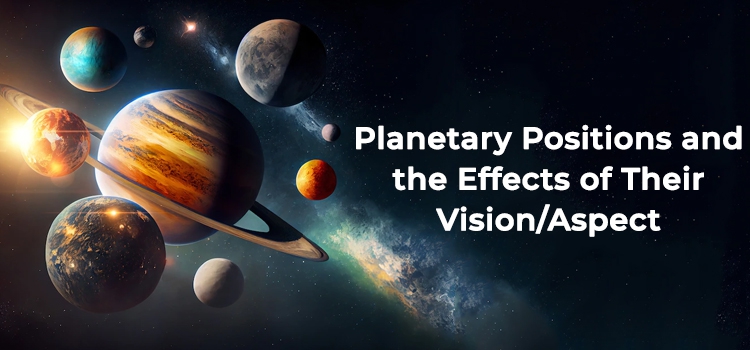Planetary Positions and the Effects of Their Vision
Astrology is an ancient science that uses the planets and stars to decode the blueprint of an individual’s destiny. The ancients studied the movements of the planets in the sky and correlated them with events happening on earth to arrive at the astrological principles they based their predictions on.
There are 12 zodiac signs and 9 planets that are important in astrology.
All the planets, except Rahu and Ketu (which are lunar nodes), are perpetually in a state of motion. Their movements have an influence on all living beings and humans on earth. They also influence the destiny of nations. The planets move at a certain speed. The Moon is the fastest-moving planet, while Saturn is the slowest, taking two and a half years to move from one zodiac sign to another.
Each planet also has a full aspect (180 degrees) on the 7th House from its position in the horoscope. Planets bestow results through the conjunction and vision of other planets present in the birth chart. Planets occupy different astrological Houses in every horoscope. Some Houses may have no planets, while some have one or more planets. Due to their positions, the planets create Yogas (beneficial results) and Doshas (malefic results) in the horoscope.

Planetary positions and the place where they are being seen are significant in astrology. They determine the auspicious and inauspicious effects that manifest in the person’s life.
The Planets and Their Effects
Usually, there are auspicious effects in the place where the planets Moon, Mercury, and Venus sit.
Jupiter tends to cause harm in the House where it sits, but it increases the favorable effect of the House it aspects.
Mars gives positive effects in the House it occupies, but everywhere else, it gives harmful effects.
In astrology, the Sun bestows the most favorable effects in Dasha, as per his strength. But it causes harm everywhere else.
Saturn increases the auspicious results of the House it occupies. But where Saturn's gaze or vision falls, its results are harmful.
But if astrology is to be believed, the positions of the planets in our birth chart are predetermined. They are not randomly placed. On the contrary, their positions are due to our past life karma. The effects they cause in our lives are the results of the good and bad deeds we performed in our past births.
Planets are the carriers of our karmic legacy. They shape our happiness and sorrow. Due to their good effects, our life becomes smooth and happy, while the bad effects cause troubles and sorrows.
Exaltation and Debilitation of Planets
When a planet sits in a high position in a zodiac sign, it is exalted. If it sits in a low position, it is debilitated.
- The Sun is in exaltation (it sits in a high position) in Aries, but it is debilitated (in a low position) in Libra.
- The Moon is in exaltation in Taurus sign and is debilitated in Scorpio.
- Mars is in exaltation in Capricorn sign and is debilitated in Cancer.
- Mercury is in exaltation in Virgo but debilitated in Pisces sign.
- Jupiter is in exaltation in Cancer and debilitated in Capricorn.
- Saturn is in exaltation in Libra and debilitated in Aries.
- Rahu is in exaltation in Taurus sign and debilitated in Scorpio.
- Ketu is in exaltation in Scorpio and debilitated in Taurus.
- Venus is in exaltation in Pisces and debilitated in Virgo.
Aspects of Planets
Apart from planetary positions in various Houses in the birth chart, the aspects of a planet from one House to other Houses are also important. Often, a planet aspecting a specific House can play a key role as it can boost or weaken the things related to that House during its Dasha.
Aspect is also called sight, Drishti, or gaze. In the same way that our gaze falls on something, planets also have a sight or gaze, which can fall on different places in the sky (Houses/signs/ other planets). Planets can also be friendly or hostile to one another.
Planets also have different percentage aspects at different Houses. For example, it may have a 100% aspect at one House, whereas it may have only a 25% aspect at another House. Every planet has 100% aspect on the 7th house from itself. This can be compared to a person looking at something right in front of him. No planet can aspect the 2nd and 12th House from itself as they are like the planet’s shoulders. The aspect’s percentage also depends on the kind of angle the planet makes to a particular house from its position. Usually, it is the 100% aspects that have the potential to trigger major events in a person’s life.
How Do Planetary Aspects Work?
Every planet is the lord of a House. But it need not occupy its own House (the House it rules). From the House it sits in, it sends a sight to the House it aspects. In other words, it takes the energy of the House it rules and takes it to the House that it occupies. Then, it sends the aspect to another House. It is from this last House that one will get the results of the House that the planet rules and where it sits.
All planets aspect the 5th, 7th, and 9th Houses from the House of their placement. Example: The Sun, which sits in Aries aspects Leo, Libra, and Sagittarius (the 5th, 7th, and 9th Houses).
Saturn, Jupiter, Mars also have special aspects apart from their 7th aspect.
There is Kendra (Angle) or Trikona sambandha (Trine relationship) as well. But aspects tend to be different in the two forms.
Aspects, to put it simply, represent the influence that each planet has on another planet or House. The strongest aspects are the mutual aspects – planets that are 1–7 from each other.
Effects of the Combinational Aspects of 2 Planets
- Sun and Mars aspect - ill health, threats, and losses
- Sun and Mercury aspect- insults, hurdles, and escapism
- Sun and Jupiter aspect - success and comforts
- Sun and Venus aspect - poor health and near-death situations
- Sun and Saturn aspect – ill health, threats, and near-death situations
- Sun and Moon aspect - profits and success
- Moon and Venus aspect - success and victory over enemies
- Moon and Saturn aspect - poor health and near-death situations
- Jupiter and Mercury aspect - immense success
- Mercury and Venus aspect - victory in all endeavors
- Mercury and Saturn aspect - disappointments and hurdles
- Jupiter and Saturn aspect - disappointments and hurdles
- Jupiter and Venus aspect - profitable situations
- Jupiter and Saturn aspect - disappointments and hurdles
- Saturn and Venus aspect will – life-threatening situations
The native’s current Vimsottari Dasa and planetary strengths in Ashtakavarga for transits have to be considered as well to confirm if the above effects will materialize.
If the Dasa is good, the negative effects will be minimized.
If the Dasa is bad, good aspects on a strong Moon, Mercury, and Jupiter can give relief.



















